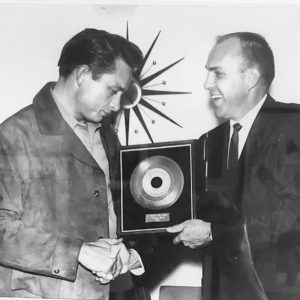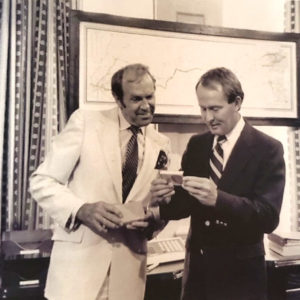calsfoundation@cals.org
Cecil Ross Scaife (1927–2009)
Cecil Ross Scaife was an actor, record producer, music promoter, and businessman who worked with some of the biggest acts in country and rockabilly music. Originally from Arkansas, Scaife worked with Sam Phillips in Memphis, Tennessee, before moving to Nashville, where he started his own record labels. Though not a musician himself, Scaife was a success story for those working in the business side of the industry.
Scaife was born on April 13, 1927, in Marvell (Phillips County) to Brooks Scaife and Elsie Lumpkin Scaife, both natives of Arkansas. The couple divorced in 1929, and Scaife’s father died suddenly a few months later in 1930.
Scaife attended what is now the University of Arkansas at Monticello, where he was elected student body president; his classmates voted him “Most Likely to Succeed,” and he was known for his wit. A fraternity member, he was involved in an infamous prank in which he and his fellow fraternity brothers stole a mule—a mascot from rival Southern State College (now Southern Arkansas University). The men posed for a picture to document the event. In 1983, they reunited for another photo—with Scaife wearing a cowboy hat—commemorating the prank.
Scaife attended graduate school at Texas Christian University in Fort Worth. Wanting to be an actor, he gained experience in theater productions in New York City and was cast in various Hollywood B-movies from the 1960s into the 1990s. He appeared in supporting roles in bizarre and low-budget films, often directed by Ron Ormond. Credits include Girl from Tobacco Row (1966); That Tennessee Beat, later changed to Country Music (1966); and The Monster and the Stripper (1968), an outrageous movie in which Scaife’s character is beaten to death with his own arm. The 1971 movie If Footmen Tire, What Will Horsemen Do?—despite its title—was not a Western, but an odd religious film dealing with the threat of communism in America. His daughter LaQuita appeared in the film with him. A later credit includes Holly Beach Murders (1992).
Scaife enjoyed acting, but he excelled in the music business. He started out in radio, working at KFFA in Helena (Phillips County). His work at Hi Records in Memphis, where he was promoting pianist Carl McVoy, won him the attention of Sam Phillips. After meeting him in the fall of 1958, Phillips hired Scaife to be his national sales and promotion manager at Sun Records in Memphis.
While at working at Sun, Scaife never relocated to Memphis, choosing instead to commute from Helena. Through his work with Phillips, he met the stars of early rock and roll such as Elvis Presley, Johnny Cash, Carl Perkins, and Charlie Rich. Scaife later told a story about helping Elvis find a new pair of pants before a show after Elvis had gotten sick on the pants he was wearing. And he was the man who handed Johnny Cash his gold record for “I Walk the Line.” His first job at Sun, however, was not easy. One of his first tasks was promoting new singles by Jerry Lee Lewis, who had recently created a scandal by marrying his young cousin. More pleasant were Scaife’s experiences with Carl Mann, who put out his rockabilly song “Mona Lisa” when he was only sixteen.
Phillips asked Scaife to manage WLIZ, his “all-girls” radio station (for which all the DJs were women) in Palm Beach, but the job did not last long. Scaife loved boating, but his wife disliked Florida. In 1961, Scaife traveled to Nashville with Sam Phillips to help him set up Phillips Recording Studio, which Scaife managed. Phillips bought the studio space from producer Billy Sherill after renovating the studio. Sherill stayed on as producer.
Scaife worked in Nashville for the rest of his life, and he quickly gained an interest in the emerging gospel music business. In 1962, convinced gospel was “growing fast,” he founded the label Songs of Faith, becoming known as one of the “Big Five” gospel labels. Within a few years, he had sold the label so that he could work at Columbia Records but returned to Songs of Faith in the 1970s.
Scaife’s career in the 1960s in Nashville included work at the Spar indie label. But in late 1965, he took a position at Columbia as an account executive and the person in charge of the custom pressing division. He was at Columbia at one of the most exciting times in the history of country and rock music. Two of Columbia’s most influential musicians were Bob Dylan—who recorded some of his best work in Nashville in the mid-1960s—and fellow Arkansan Johnny Cash.
In April 1972, Scaife left Columbia to seek his own fortune. He bought back Songs of Faith from Bill Beasley, who had previously worked with him and Sam Phillips in Nashville. Around this time, Scaife and his wife founded Music Incorporated. In early 1974, they put out their first original country song. Music Incorporated, however, specialized in discount music, especially Christmas titles. The label’s offerings included everything from Elvis’s holiday songs to Alvin and the Chipmunks. The label had the largest catalog of Christian music in the country and was the most successful producer of bargain Christmas albums. The Scaifes also owned a secular label, Tennessee Music Publishing.
Scaife was involved with many organizations, including the Gospel Music Association (which he co-founded), the National Board of Governors/Grammy Awards Committee, the Country Music Hall of Fame, the Country Music Association, the National Association of Recording Merchandisers, and the Nashville Chapter of the Recording Academy. The Cecil Scaife Visionary Award, given to those who work to ensure that future generations will succeed in the music industry, is named after him. Recipients have included musicians Amy Grant and Wynonna Judd.
Scaife was a colorful character known for his cowboy hats, unique fashion sense, and large cars. His daughter recalled that she never knew what her father would wear on any given day or what kind of country music celebrity might show up for a meal. Scaife was also an avid boatsman who designed his own yacht and often wore a captain’s hat.
Scaife was married for fifty-nine years to Sherytha Payne Scaife, a Helena native who had gone to school with Conway Twitty. Known for her good looks, glamour, and religious faith, she worked at the Country Music Hall of Fame as the museum’s first curator. With Cecil, she co-founded Music Incorporated in the 1970s, and she was also active with her husband in promoting the music business program at Belmont University, a Christian college in Nashville. The couple had four children: LaQuita, LaRawn, Joe, and LaQuela. Joe Scaife became a record producer in Nashville, known for his work on Billy Ray Cyrus’s multiplatinum debut album.
Scaife retired in 1998. He died on March 5, 2009. He is buried in Mount Olivet Cemetery in Nashville; his wife died in 2018 and is buried next to him. His marker includes the Lord’s Prayer in its entirety.
For additional information:
“Cecil Ross Scaife.” Tennessean, March 7, 2009. https://www.legacy.com/us/obituaries/tennessean/name/cecil-scaife-obituary?id=10152620 (accessed December 9, 2022).
Escott, Colin, and Martin Hawkins. Good Rockin’ Tonight: Sun Records and the Birth of Rock and Roll. New York: St. Martin’s Griffin, 1991.
“Gospel’s ‘Big 5’ Labels Dent Overall Picture.” Billboard, February 27, 1965, pp. 3, 44.
Sims, Barbara. The Next Elvis: Searching for Stardom at Sun Records. Baton Rouge: Louisiana State University Press, 2014.
Woodward, Colin (host). “LaQuita Scaife (No. 217).” American Rambler, December 17, 2021. https://americanrambler.libsyn.com/episode-217-laquita-scaife (accessed December 9, 2022).
Colin Edward Woodward
Richmond, Virginia
 Business, Commerce, and Industry
Business, Commerce, and Industry Divergent Prosperity and the Arc of Reform, 1968–2022
Divergent Prosperity and the Arc of Reform, 1968–2022 Music and Musicians
Music and Musicians Scaife and Cash
Scaife and Cash  Cecil Scaife
Cecil Scaife 




Comments
No comments on this entry yet.